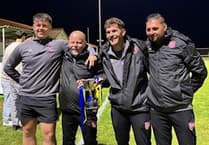Last week The Journal published the second in a serial of extracts from an interview conducted with Martin Cassidy, the CEO of the RefSupport, on the Toolstation Western league Podcast. In this third extract, Podcast presenter, Ian Nockolds, asks Martin how the laws of the game relate to the laws of the land and where, from a Match Officials point of view, a game starts and ends.
MC: Well, the process is you report (an incident) to the FA, or the county FA, different levels of football go straight to the FA, or goes to the county FA. If the FA or the county FA thinks it’s a serious incident, it goes up to the FA serious case panel, which this one should. And, interestingly, it’s a point that we don’t agree with the FA on, is that once you sign up as an affiliated club or affiliated player you don’t step out, you literally do not step out of FA regulation.
If you’re doing stuff in the supermarket, and you threaten a referee, that referee knows who you are, you can get done for it. We’ve had it. So, I disagree with that because one of our ambassadors got charged, because he wrote a letter to a club saying, ‘we know you abused referees, we’ve got it on video’, but they were found not proven on a case because the FA wouldn’t allow the video evidence. ‘We’re going to go and watch you and we’re going to video you again. Because you’re in a public place.’ It was a Saturday we used - well he got charged, he actually got charged, even though we wrote it in a REF Support email and said, ‘I’m talking to you as an ambassador’ because he was a registered referee, he got charged. Well, I defended him, the FA had a barrister on the panel. I went up to Manchester and I represented him and we won the case because I said, ‘if he was a police officer and did exactly the same, as a police officer email address, are you telling me you could charge him? And they said, ‘yeah,’ they said yeah, they could. So, of course, we got the police involved, police officer said, ‘I would love to see them do that. Love to see them do that.’ So, we won the case on the fact that we clearly identified that he was an ambassador for a registered charity. We clearly identified the right process because we went to the FA nationally, we went locally, and we went to the league, and we went to safeguarding, as well.
So, we followed all the policy, procedures, and process so they couldn’t use it against us, because we’d done what they told us to do, really. So, the answer is you don’t step out of FA regulation, you really don’t. It’s outrageous. So, players need to remember that. Players need to remember that if they have a pop at a referee over the game or something he’s done while he’s refereeing, even in the supermarket, even in the pub, they can get charged for it.
I still think that the law of the land should take precedent over the laws of the game, I’ve said that, but it doesn’t. One of the cases we put up had been of a lad caught on video got beaten on the floor. The FA mitigated the fact that he’d had a 10-year ban. So, they said, ‘we’re only going to caution him.’ There was another case called Satyam Toki, I think I talked to you about it. Three punches in the face. The player said, ‘oh, I’m gonna lose my job and I want to be a professional footballer’ So, they [the police] said, ‘Okay, we’re not going to take you to court, we’re going to give you a caution.’ Because the FA banned him for ten years. Then he appealed against the 10-year ban that got reduced to five years. That’s a really good example as why the police should go first because you can’t mitigate anything, and that mitigation that they were using got lessened by 50%, do you see what I mean?
So, I think anything that involves an assault or serious abuse like that should [have] the police take over. And I think leagues need to have a bit more control that they can step in and go, ‘I tell you what, we’re gonna ban him ourselves, we’re going to deregister him, he can’t play for that league, and we’re going to await the outcome of the police case and the FA case.’ I think there’s the situation like that where they can do it but the important part of what we do when we go publicly at clubs, like we have with that particular case - I’m intentionally not naming them, just trying to be considerate, really - is that they’ve got sponsors. And then we could go after the sponsors and say, ‘Do you really want to be involved with a club that one of their players have thrown a pint through the window of a car? Do you want to be involved?’ So, there’s a very different tact we could use ... and people listening might think, ‘that’s out of order’, well, if these clubs aren’t going to step up and say, ‘yeah, it was one of our players, we banned them’, then football needs to have an alternative to that.
So, I think strategising-wise and why we do it on social media, it’s really important to understand that, you know, you can’t do these things and get away with it, you just can’t.
IN: I think many people listening to this will be really surprised to hear how you’ve explained the relationship between what goes on within football, and it’s not even on the football pitch, clearly, what you’ve explained is what happens within football, and its relationship with the law of the land.
One of the freedoms, if you like, that we all enjoy, or one of the rights, sorry, that we all enjoy, is that we are innocent until proven guilty. So, I guess that the challenge is that if you are going to start mixing different judicial processes, and the law of the land is going to say, ‘well, we’re not going to get involved in that because we consider it to be a football matter’, regardless of whether it happened on a football pitch or not, does the football process - and I guess certainly where the Western League is concerned, of course, we would expect these processes to be conducted by the county FAs - in your experience, is there a different threshold of guilt? Is there a different threshold of evidence? Is there a different threshold of being innocent until proven guilty? Are the two systems that we’re conflating, in some respects, are they actually different in your experience?
MC: Oh, absolutely different. It’s classed as a civil process, really, with the FA, and they don’t have not guilty, do they? It’s a proven not proven, Whereas the law of the land is guilty / not guilty? So, that’s the first big difference, but the balance of probability with regards to how the FA doing things, no matter how many players say this, because I find quite interesting with the argument of this, I think we could do a whole podcast on this - is because loads of the clubs say, ‘ahh, the referee, they always back the referee.’ Well, I’m hearing from referees they always back the club.
So, I would be really interested to see how many ‘not proven’ cases there are, because I know there’s a lot and we used it against the FA, because the FA said there’s only 0.01% of games that involve a proven case of assault. But that doesn’t mean there’s no more than that that happened, it just means that’s what’s been found guilty in their process. And it also doesn’t take into consideration that the match official might have been beat up, doesn’t want to report it, because he lives in Bristol, or in Cornwall, in the same town as the person who’s assaulted them. So, they’re a bit scared to report it because they’d bump into them in the pub, which is what I mentioned earlier.
So, it’s a massive, massive piece. And what happens is - interestingly enough, was something we really, really don’t like about it - the referee is classed as a witness so he can’t bring witnesses. I don’t know if you knew that. But a club could bring 10 people, and all say the same thing, and they’ll win the case. Because the balance of probability is naturally in the favour of the player or the club.
So, the actual process is, I feel, really balanced in favour of the clubs. And it’d be really interesting to see how many cases are not proven in cases like this purely because the referee, at best, has got two [linos?] and a fourth man, fourth official, fourth man.
So, interesting.
Next week, Ian and Martin discuss the how the number of incidents of Match Official abuse reported during the last season compares with previous seasons. The full interview with Martin can be found online at http://toolstationleague.com/season-2022-23-podcast-episode-39/. The podcast can also be heard below:





Comments
This article has no comments yet. Be the first to leave a comment.